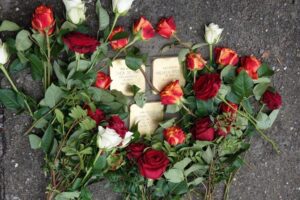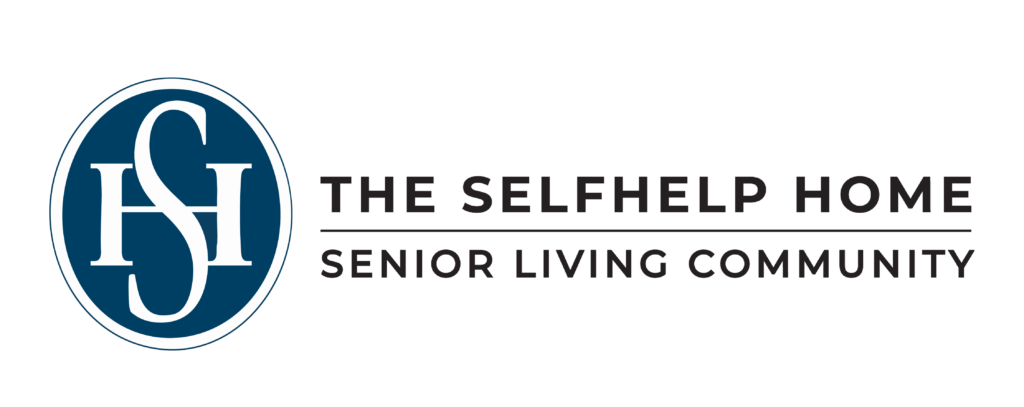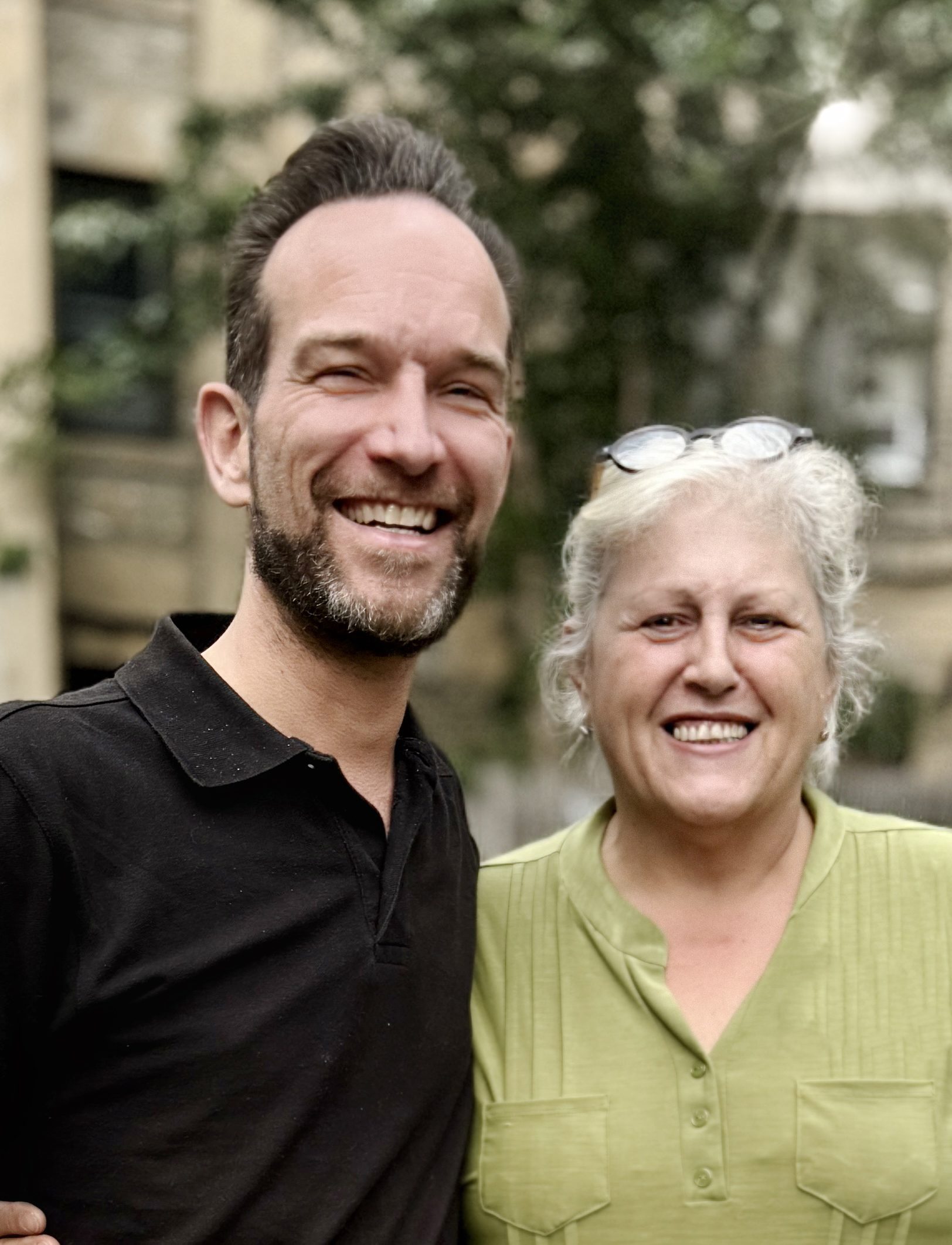Catching up with our first ARSP volunteer!
By Jan Schultheiß
Since 1998, The Selfhelp Home has partnered with the Berlin-based Action Reconciliation Service for Peace (ARSP), who’s primary mission it is to experience history together and take responsibility for the future. They also take a stance against antisemitism, racism, and injustice. Furthermore, they set an example for remembrance, solidarity, and peace through voluntary commitment and international cooperation in Europe, Israel and the United States of America.
PART I.
My encounter with Dorothy Becker and her family
A Stroke of Luck and a Gift
Remarks for the stumbling stone ceremony for the Becker/Shaffer family
July 12, 2024, Berlin
(Photo by Gundi Abramski)
 In the spring of 1998, after a long Greyhound bus ride from Philadelphia, I arrived at my new home for a year and a half: The Selfhelp Home on the northside of Chicago, 1 block from Lake Michigan. I was the first volunteer there for Action Reconciliation Service for Peace.
In the spring of 1998, after a long Greyhound bus ride from Philadelphia, I arrived at my new home for a year and a half: The Selfhelp Home on the northside of Chicago, 1 block from Lake Michigan. I was the first volunteer there for Action Reconciliation Service for Peace.
At that time, in 1998, many Holocaust survivors still lived at The Selfhelp Home, and my task was to accompany and support them in the area of leisure activities. One of my first encounters was with Dorothy Becker: she had an impressive appearance, in a blue dress with thick glasses and thick gray curls. The then 87-year-old Dorothy Becker initially had mixed feelings, as well as curiosity: For her and many other residents, I was the first German they had met in decades. Together with her husband William Becker, Dorothy had co-founded the facility for refugees and survivors of the Holocaust after their own escape. Mrs. Becker did not want anything to do with German people.
Ursula Levy, aa mutual friend, described this in her 2004 book about Dorothy Becker, The Spirit Builder: “To some of the older refugees, Jan didn’t seem quite kosher. But with understanding, tolerance and subtle humor, he soon won over the most guarded residents.” Over time, everyday life and trust developed, and many residents started to see me as simply a young person who listened to them and kept them company. Quite quickly, I had many new grandmothers and grandfathers. For example, they threw me a birthday party for my 21st birthday. The ice seemed fully broken by Christmas morning 1998, when a number of residents, including Mrs. Becker, surprised me with Christmas carols in English and German to brighten my holidays away from home. A very moving moment.
This was the starting point for many precious friendships, especially with Dorothy Becker and her daughter Marian, as well as Marian’s children and grandchildren, among them Lori and Marisa who are here today to my great joy.
Dorothy Becker would probably never have visited Germany again, but after her mother’s passing, Marian accepted an invitation from the Berlin mayor’s office to visit her former home in the year 2000 as part of a group of approximately 100 former Berlin residents invited back. When Marian was traveling in Berlin with her son, she became very concerned when she saw that all Jewish institutions needed permanent protection. This concern was somewhat offset by several highlights, such as the visit to the house where she lived from the age of 4 to 7, with its very hospitable and sensitive current owners. She was happy that after 65 years she still found her way to the nearby lake by herself. Another highlight was a visit to the Hotel Adlon, where she had spent her last night in Germany in 1937, before her family took the ship to freedom. However, the museum in the nearby Holocaust memorial brought back so many memories and touched her so deeply that she had to leave it quickly.
Many mutual visits followed in Wyoming, in Oregon and in my hometown in southern Germany. Marian, of course, joined me for my two university degrees in Chicago and Boston and got to know and to like my family. A close, very trusting, almost family bond developed. This was a stroke of luck and a gift. A lot connected us: The American-German, Judeo-Christian cultures and the interest in art, mountains, progressive, open politics, and moose (!)—as well as a sense of oddities. For example, on a joint trip to Death Valley at record temperatures, we tried (completely unsuccessfully) to fry an egg on the car hood. Marian had such an infectious laugh!
Perhaps, through our friendship, Marian was able to get a little closer again to her original, stolen home city and country. For example, she visited the Berlin synagogue where her parents got married, her father’s birthplace and her ancestral graves in the Palatinate, as well as the University of Heidelberg, where her father had studied medicine.
Our common path has become a vibrant story of its own, which continues to be written today with the stumbling stone dedication for Dorothy Becker, her husband William, and their daughter Marian. In times like these, it seems particularly important to me that we actively remember our history, learn from it and take a decisive stand against injustice and for solidarity and freedom. I would like to thank everyone who made the stumbling stones and today’s ceremony possible – the young people and team of the Spandau Youth History Workshop, the owner of the house and everyone who came to honor the Becker/Shaffer family.
PART 2.
Interview with Jan
Jan, what have you been up to since your time at the Selfhelp Home?
I was at The Selfhelp Home for a year and a half, from March 1998 through August 1999. I then went on to study Art History at Roosevelt University and received my Bachelor degree in 2003. While preparing for graduate school, I returned to Selfhelp and worked as a front-desk night-shift for several months between 2003 and 2004. After six years, I left Chicago to pursue my graduate studies in Urban Plannung at Harvard University, Graduate School of Design, where I received my Masters degree in 2006. Since then, I have held various jobs in urban planning and development in New York, New Jersey and Berlin.
For the past five years, I have been working for the federal government, currently in the Department for Housing, Urban Development and Building. One current work assignment, with ties to the work of Action Reconciliation Service for Peace (ARSP), is the “dissonant cultural heritage of the 20th century“, in which we develop approaches and a toolbox to deal with places of war, persecution, injustice, environmental pollution etc.
I continue to be engaged, to varying degrees, with ARSP – I have been a member, have participated in workshops to select new volunteers, and have helped to plan summer camps.
I also founded an initiative to promote historic preservation and equality in the building profession (Initiative Haus Marlene Poelzig). Furhermore, ever since living off of Lake Michigan and enjoying the lakefront immensely, I have been a marathon runner, and am currently training for my 15th marathon.
What impact has Selfhelp had on your life?
My service at Selfhelp allowed me to establish meaningful, inspiring, long-lasting friendships with residents and their families, for instance with Edith Stern, Dorothy Becker and Marian Shaffer, Mitzi Marx and Emily Ewing, as well as staff and board members, for instance Fern Shaffer, Sofia Metovic, Austin Hirsch, as well as those close to Selfhelp, among them Ursula Levy.
My time at the home also made me much more familiar with Judaism, Jewish traditions and customs. It also raised my awareness of the importance of standing up for justice and peace, as well as of issues of exclusion, discrimination and traumatic loss: I learned about different strategies for coping with trauma – most people I met embraced life and countrageously built a new life for themselves and restored their faith in humans. Furthermore, my time at Selfhelp also put age into perspectice – some in the 90-and-over crowd were quite youthful! Now, I actually live on top of a retirement facility in central Berlin, and it feels very familiar.
At The Selfhelp Home we are dedicated to partnering with ARSP to contribute to enhancing the lives of our residents. To learn more about us, please visit us online or contact us directly.
Online: SelfHelpHome.org
Phone: 773.271.0300
Email: [email protected]


